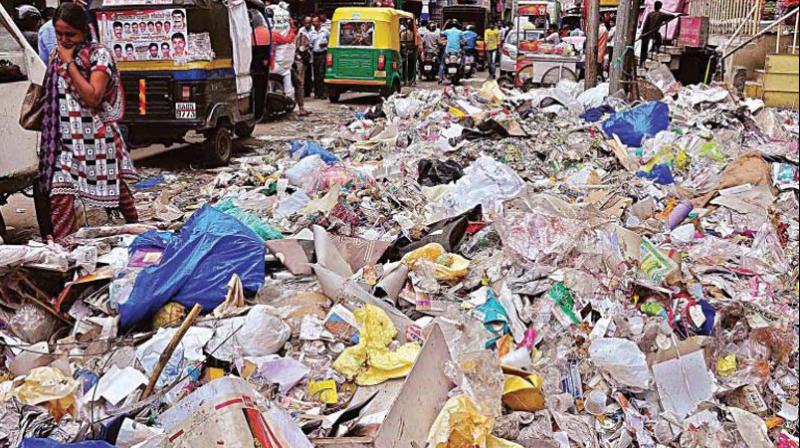Recycling plastic: No quick fix in sight

Bengaluru is one of the largest generators of plastic waste in the country, despite the BBMP ban. Many consumers have switched to steel containers and cloth bags but plastics are used in a variety of goods, including instant foods and are not so easily replaced. Small-time vendors are raided regularly and pay a heavy price in the absence of alternatives, while large retailers and e-commerce giants, the largest users of banned plastic, continue to do so with impunity. These materials, especially multi-layer plastic, cannot even be recycled and end up in landfills, where they take hundreds of years to decompose. There is biodegradable plastic but without authorities identifying banned materials and clamping down on their production, the burden on the environment will continue, especially as manufacturers use misleading labels on their products, report Aknisree Karthik and Aksheev Thakur
The BBMP has issued a ban on plastic, which it is trying to implement in totality. But can this be done? Plastic, after all, isn't limited to the carry-bags we get at retail stores, most of the items we use in our daily lives come packaged in it. There are bio-degradable plastics, but how does one identify them? Often, manufacturers simply put labels on regular plastics, claiming they're bio-degradable. One of the most harmful forms of plastic is in use everyday - sachets used to hold shampoos, soaps, even readymade spices and the sealed packets that hold the chips our children eat.
The material used in these cases comprises aluminium, and is known as MLP, or multi-layered plastic. These end up in landfills, where they increase the growing burden on the environment. Even ragpickers, who pick plastic waste to sell to recycling units, avoid this type. "Other plastics fetch them between Rs 4 and Rs 20 per kilo," explains Rajesh Babu, the co-founder of Swachha Eco Solutions, an NGO. "MLPs have little to no monetary value, so ragpickers ignore them."
These wrappers, avoided by everyone, are made of aluminium and are referred to as multi-layer plastics (MLP). The recycling process for plastic requires it to be heated to nearly 200 degrees. However, since MLPs contain aluminium, they need to be heated at higher temperatures, which means they are commercially viable as far as recycling is concerned. This is why they are such an environmental burden, says Babu.
“Everyday, the city generates anything between 5000-5,500 tonnes of waste. About 40 percent of this is wet waste, while the remaining 60 percent is dry waste. Nearly 40% of this dry waste is made of plastic and over 60% of this plastic is non-recyclable, ending up in the landfill,” says Babu. “The packaging standards must be changed.”
Manufacturers, however, have shown no interest in changing their packaging materials to bio-degradable plastics, as the MLP variety is more economically viable. “From an environment perspective, though, they have to change,” he says. He also argues that the consumer has a role to play too and can avoid items that use non-biodegradable plastic. “Those who cannot afford alternatives have no choice. But the rest of us have the option of buying things in bottles or boxes and can avoid the sachets.”
Gradually, there are sustainable packaging alternatives like plant-based plastics, mushroom roots, bagasse, stone paper and plastics, corn starch etc which are slowly entering the packing industry. They will try to replace the non-biodegradable plastics, Babu said.
He did caution that the change will happen only if consumers are proactive and demand that manufacturers shift to sustainable packaging.
City generates 660 tonnes of plastic, but KSPCB silent
Only 14 regional pollution boards have filed information on plastic waste generation in 2017-18, which was released in April this year. Karnataka was among the states that did not reveal the information.
The estimated plastic waste generated by the city is 660,787.85 tonnes. The non-biodegradable packing materials used by e-commerce companies and shops across the state are believed to take hundreds of years to degrade.
Solid waste management experts explain that the issue has been triggered by a pattern of consumerism that demands a certain kind of packaging – the type that can be disposed of easily, without too much hassle.
“The dominant narrative of the day seems to say that these packaged products are the best. However, this creates havoc in the management of waste, as most of these packaging materials are non-biodegradable and take hundreds of years to decompose naturally. The single-use disposables that has become synonymous with a certain kind of development, with luxury and status, has proved hugely detrimental to the environment that sustains life itself,” says Ram Prasad, a solid waste management expert.
Non-biodegradable materials used in packaging, account for almost 80 percent of the plastic produced in the country and are used mainly by e-commerce giants.
“These non-biodegradable packaging materials, especially the multilayer packaging and use of plastics, degrade into micro and nano particles that enter even our drinking water. These particles are known for their cancer-causing properties,” says Prasad, adding that every inch of water and land has been polluted by this single-use behaviour of consumerism,” he adds.
In 2010-12, the CPCB data revealed that Bengaluru produced 31 tonnes of plastic waste and, despite being a major contributor the state did not provide information on plastic waste generation in 2018.

